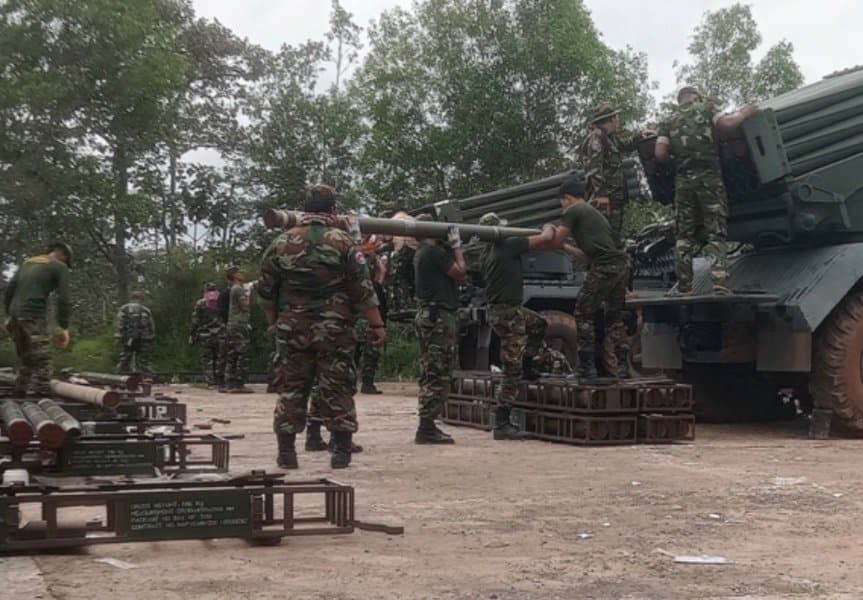Border Tensions Rise: Understanding the Conflict Between Thailand and Cambodia

On Thursday, escalating tensions between Thailand and Cambodia erupted into a violent confrontation along their shared border, resulting in the deaths of at least 12 Thai nationals, primarily civilians. The situation remains fluid, with both nations blaming each other for the outbreak of hostilities, which reportedly began with gunfire. Thailand has accused Cambodia of launching rocket attacks, while it has responded with airstrikes targeting Cambodian military positions. The conflict has deep historical roots, and the international community is closely monitoring the situation as fears of further escalation loom.
Historical Context of the Dispute
The conflict between Thailand and Cambodia is not a recent development; it has historical roots that trace back over a century. The origins of the dispute can be linked to the demarcation of borders following the French colonial rule in Cambodia. Tensions escalated significantly in 2008 when Cambodia sought to register an ancient temple located in the contested area as a UNESCO World Heritage Site, a move that provoked strong opposition from Thailand. Since then, sporadic clashes have occurred, resulting in casualties on both sides.
The most recent surge in tensions began in May when a Cambodian soldier was killed during a confrontation, marking a significant downturn in diplomatic relations. In the following months, both countries imposed border restrictions on each other, with Cambodia halting imports of Thai goods, including fruits and vegetables, and suspending the importation of electricity and internet services. Additionally, both nations have increased their military presence along the border, further heightening the risk of conflict.
Details of the Recent Confrontation
The events of Thursday unfolded rapidly, with both Thailand and Cambodia providing conflicting accounts of the incident. According to Thailand’s National Security Council, the confrontation began around 07:30 local time when Cambodian military forces deployed drones for surveillance near the border. Shortly thereafter, Cambodian troops allegedly armed with rocket-propelled grenades gathered in the area. Thai soldiers attempted to negotiate but were met with gunfire from the Cambodian side at approximately 08:20, prompting a retaliatory response.
Thailand claims that Cambodia utilized heavy weaponry, including BM-21 rocket launchers, which resulted in damage to civilian infrastructure on the Thai side, including homes and public facilities. Conversely, Cambodia asserts that the conflict was initiated by Thai soldiers who violated an agreement by advancing towards a Khmer-Hindu temple and setting up barbed wire. Cambodian officials allege that Thai forces fired shots into the air before launching a preemptive attack, forcing their troops to defend themselves.
Prospects for Resolution
In light of the recent violence, Thailand’s acting Prime Minister Phumtham Wechayachai emphasized the need for a careful approach to the dispute, advocating for resolution in accordance with international law. Meanwhile, Cambodian Prime Minister Hun Manet expressed a desire for a peaceful resolution but stated that his country would respond to armed aggression with force if necessary. Despite the serious nature of the exchanges, historical patterns suggest that such conflicts have typically de-escalated relatively quickly.
However, analysts warn that the current lack of decisive leadership in both countries may hinder efforts to resolve the situation peacefully. The international community remains watchful, as the potential for further escalation could have significant implications for regional stability.
Travel Safety Considerations
As the situation develops, the British Foreign Office has not yet issued a specific travel advisory regarding the conflict. However, it has advised travelers to exercise caution in the region, particularly near tourist sites such as the Preah Vihear temple and other locations close to the border. The ongoing fighting is localized, but the closure of border crossings in recent weeks has raised concerns among travelers. Meanwhile, China has advised its citizens in Cambodia to avoid the Thai border area, reflecting the heightened tensions and potential risks associated with the ongoing conflict.
Observer Voice is the one stop site for National, International news, Sports, Editor’s Choice, Art/culture contents, Quotes and much more. We also cover historical contents. Historical contents includes World History, Indian History, and what happened today. The website also covers Entertainment across the India and World.

